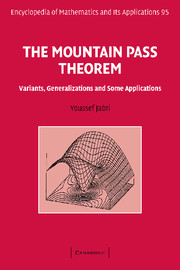Book contents
- Frontmatter
- Contents
- Introduction
- 1 Retrospective
- I First Steps Toward the Mountains
- II Reaching the Mountain Pass Through Easy Climbs
- III A Deeper Insight in Mountains Topology
- IV The Landscape Becoming Less Smooth
- 14 The Semismooth MPT
- 15 The Nonsmooth MPT
- 16 The Metric MPT
- V Speculating about the Mountain Pass Geometry
- VI Technical Climbs
- A Background Material
- Bibliography
- Index
14 - The Semismooth MPT
Published online by Cambridge University Press: 04 September 2009
- Frontmatter
- Contents
- Introduction
- 1 Retrospective
- I First Steps Toward the Mountains
- II Reaching the Mountain Pass Through Easy Climbs
- III A Deeper Insight in Mountains Topology
- IV The Landscape Becoming Less Smooth
- 14 The Semismooth MPT
- 15 The Nonsmooth MPT
- 16 The Metric MPT
- V Speculating about the Mountain Pass Geometry
- VI Technical Climbs
- A Background Material
- Bibliography
- Index
Summary
Soon after Baire had introduced in 1908 the concept of semicontinuity for real valued functions, Tonelli, in 1914, recognized semicontinuity as one of the relevant properties of the functionals of the calculus of variations.
L. Cesari, Optimization. Theory and applications, Springer-Verlag, 1983A notion of critical points for continuous convex perturbations of C1-functionals defined on a Banach space X is introduced, and an appropriate version of the MPT is proved. The same minimax argument serving to obtain a critical level in the classical version is used here too, to get a critical value corresponding to the new notion of critical point.
The main result of this chapter is taken from Szulkin [891]. It extends critical point theory to functionals of the form Φ + Ψ in a real Banach space X, where Φ: X → ℝ is a C1-functional, and Ψ: X → ℝ ∪ {+∞} is a convex and lower semicontinuous (l.s.c.) perturbation. Denote by D(Ψ) = {u ∊ X; Ψ (x) <+∞} the effective domain of Ψ. The most important point here is to find an appropriate definition of nonregularity/regularity in this particular context and the rest of the program of projecting C1-critical point theory for functionals of this form should be a priori easy.
- Type
- Chapter
- Information
- The Mountain Pass TheoremVariants, Generalizations and Some Applications, pp. 163 - 173Publisher: Cambridge University PressPrint publication year: 2003

